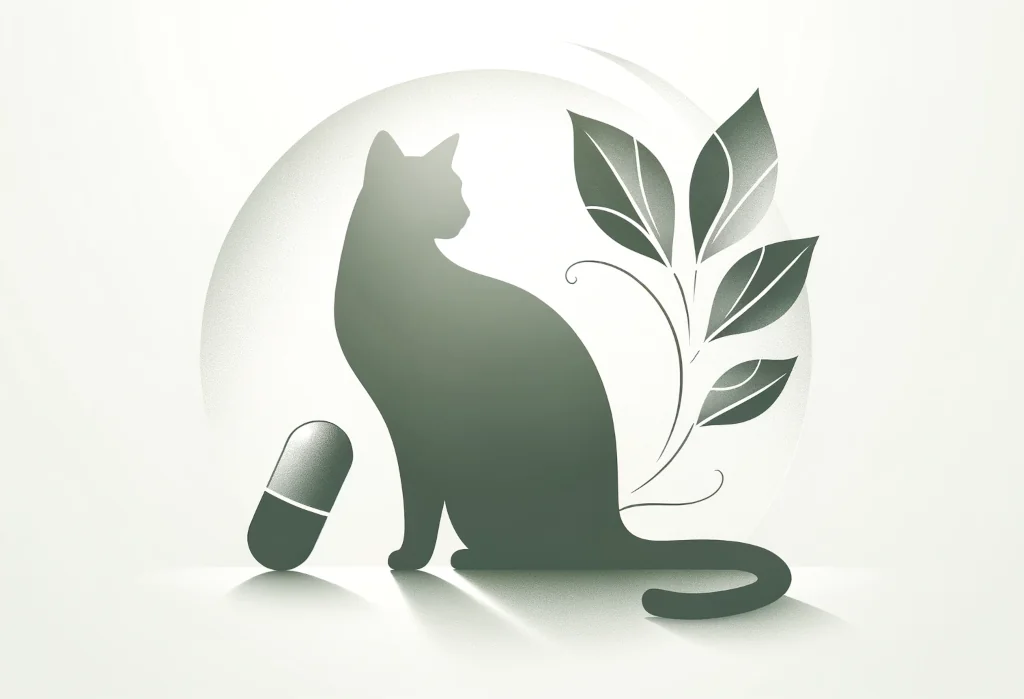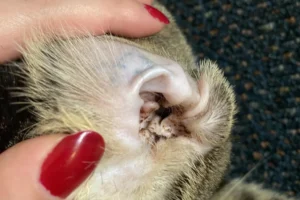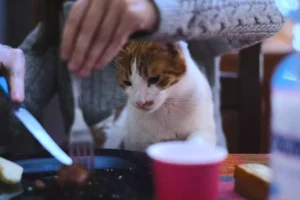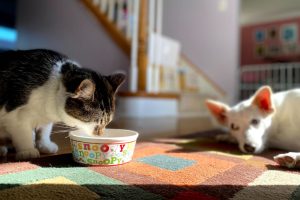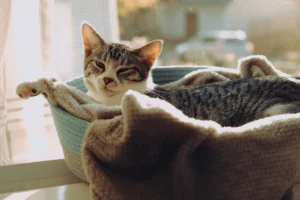We all love our furry feline friends, right? Right. But decoding their nutritional needs could make solving a Rubik’s cube look easy in comparison. When your kitty gives you that purr-fect look, you might wonder if you’re doing everything you can to keep its tiny tummy more than just satisfied.
This blog post will guide you through the ins and outs of feline nutrition and pinpoint when it’s time to consider adding supplements to your cat’s diet.
Key takeaways:
- Spot dietary gaps by observing your cat’s coat quality, energy levels, and digestive health; changes may signal a need for supplements.
- Always consult your vet before supplementing as they will tailor advice to your cat’s specific nutritional needs and health status.
- Choose supplements with clear labels, backed by reputable organizations, and avoid unnecessary fillers to ensure your cat’s safety and health.
What Are the Signs of Nutritional Deficiencies in Cats?
When it comes to our feline friends, the signs that something’s amiss with their diet can often be subtle, but they’re definitely worth paying attention to.
Poor nutrition can quickly lead to various health issues. A dull coat can suggest that your cat isn’t getting enough omega fatty acids. Weight changes—particularly weight loss or signs of obesity—are clear flags that the diet may need tweaking. And a lack of energy can be worrisome, showing that your kitty might not be getting the essential nutrients they need to thrive.
If you notice that your pal’s fur has lost its luster, or if they’re not quite the sprightly creature they used to be, it’s worth having a chat with your vet. Frequent digestive upsets like diarrhea or constipation, dry skin, and even a poor immune response could all be linked to what your kitty is—or isn’t—eating.
Can You Rely Solely on Cat Food for Your Kitty’s Nutrition?
Choosing the right food for your cat is akin to hitting the nutrition jackpot. Most cat food options are designed to be nutritionally complete. You’ve probably come across the classic dry kibble, which is convenient and great for dental health, and wet food, which boasts high moisture content that’s great for hydration.
For those feeling fancy, there’s also raw diet—a choice that’s not without its controversy due to potential health risks, but which some swear by for its closeness to a cat’s natural diet.
Despite these options, a healthy cat on a well-balanced diet typically doesn’t need additional supplements. Quality commercial diets are formulated with a cat’s nutritional needs in mind. However, there’s a catch: not all cat foods are created equal. Look for options that carry an AAFCO (Association of American Feed Control Officials) statement, which ensures that the diet meets minimum nutritional requirements for cats.
What’s critical to understand is that more isn’t always better—especially when it comes to nutrients. Over-supplementing can do more harm than good. Stick with a high-quality, balanced diet, and you’re likely covering all bases nutrition-wise.
When Do Vets Usually Recommend Supplements?
Supplements aren’t typically a topic of conversation for a kitty who’s in the pink of health. However, there are certain scenarios when your vet might recommend upping the ante on your cat’s nutrition game. For example, kittens often benefit from supplements that support their rapid growth and development—think of them as kitty’s little body builders.
Similarly, senior cats may need a boost too. As they age, their ability to absorb nutrients can wane, and their dietary needs can change. A senior-specific supplement might just be the ticket for keeping them spry in their golden years.
Moreover, in cats with health issues such as kidney disease or digestive problems, veterinarians often prescribe specific supplements to help manage these conditions. Pregnant cats are another bunch who might need additional nutrition to support both mama and her growing litter.
But here’s a tidbit most folks might not know: your kitty’s indoor lifestyle could play a role in their dietary needs. For instance, indoor cats don’t get the same natural sunlight exposure as outdoor cats, which can affect their Vitamin D levels. While it’s still a topic of debate and research, some evidence suggests that indoor kitties might benefit from Vitamin D supplementation.
Always consult with your vet before adding any supplements to your cat’s diet. They understand the ins and outs of feline nutrition, and they’ll be able to point you and your whiskered companion in the right direction.
Remember, these sections aren’t the whole shebang. We’re just scratching the surface of cat nutrition, so stay tuned for more purr-worthy insights that will help keep your feline friend healthy and happy.
What Dietary Supplements Should You Consider?
When it comes to pampering our purring pals with the best care, dietary supplements can play a significant role in maintaining their optimal health. But it’s not just about throwing a mix of vitamins and minerals their way and hoping for the best. Let’s dive into a few common supplements that might be just what the vet ordered.
- Omega-3 Fatty Acids: These are the crème de la crème of fats. They can help manage inflammation, support skin and coat health, and even improve cognitive function. If Fluffy has a dry coat or is battling with allergies, omega-3s might be your go-to supplement.
- Probiotics: Here’s where things get a bit, well, gut-ural. Probiotics are the good bacteria that keep the digestive system in check. They can be a game-changer for cats with gastrointestinal issues, helping to maintain a friendly environment in the belly realm.
- Antioxidants: Think of these as the body’s personal security guards, fighting off the damage from free radicals. Supplements like vitamins E and C, and selenium can help to support the immune system, and they might come in handy for older cats or those under stress.
- Joint-Supporting Compounds: Glucosamine and chondroitin are the dynamic duo for cats with creaky joints, often giving a new lease of life to senior felines who have started to slow down.
Now, not every supplement is a must-have. You’ve got to look at your cat’s diet and lifestyle to determine if there’s a gap or a specific need for these extras. What’s the scoop on their poop? Is their coat less than luscious? These signs can signal a need for supplementation.
How to Choose the Right Supplement for Your Cat?
Let’s get to the meat of the matter—how do you pick the purr-fect supplement for your feline friend?
- Read the Label: If it reads like a secret code, pass it by. Look for clear labeling with ingredients that make sense. Keep an eye out for a seal of approval from organizations like the National Animal Supplement Council (NASC).
- Vet Knows Best: Before you make a move, have a chat with your vet. They can help you pinpoint what’s necessary and safe for your kitty.
- Quality Over Quantity: Don’t let your wallet lead you astray. Cheaper options can often come with fillers and questionable quality. So, spring for supplements that have undergone thorough testing and come from reputable brands.
- Specific Needs, Specific Solutions: Here’s something you might not hear often – cater to your cat’s breed. Some breeds may have unique health predispositions that can be supported with tailored supplementation (e.g., certain breeds might benefit more from joint supplements due to their size and genetic predispositions).
When you’re browsing the aisles or surfing the web for the right supplement, it’s not just about what’s on the label, it’s about what’s not on it too. Fillers, artificial colors, and flavors are often unnecessary and can cause more harm than good. Go for the good stuff—products that contain pure, human-grade ingredients whenever possible.
A specific and often overlooked tip? Pay attention to your cat’s water intake. Cats that don’t drink enough might benefit from supplements in a liquid form, making it a sneaky way to increase hydration.
In conclusion, supplementation for your cat should never be about shooting in the dark. It requires observation, understanding your cat’s unique needs, and partnering with your vet. By choosing thoughtfully and taking this targeted approach, you can add a sprinkle of supplement magic to your cat’s life, ensuring they’re not just surviving, but thriving.
Alex, a passionate animal lover, has experience in training and understanding animal behavior. As a proud pet parent to two dogs and three cats, he founded AnimalReport.net to share insights from animal experts and expand his knowledge of the animal kingdom.

